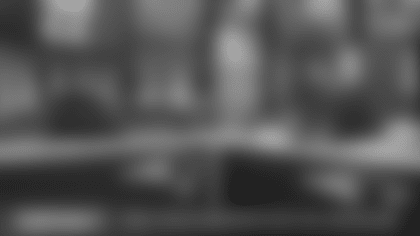DIRECTOR OF PLAYER PERSONNEL NICK CASERIO
PRESS CONFERENCE
April 28, 2018
NC: I appreciate everybody's time and cooperation here this weekend. Certainly, a lot of work, a lot of effort from a lot of people, a long day. There's no sense in kind of going through the trade recap. Hopefully, everybody wrote it down in pencil as you were going through the day. The net of all this movement essentially would be the third next year that we acquired from Detroit as an extra pick, and then the seventh, kind of at the end, was a little bit of a throw-in with the 2019 pick there from Philadelphia. So just kind of going through the actual picks – so the first two picks [were] relative to the whole front seven sort of linebacker discussion. Ja'Whaun Bentley from Purdue – this kid's got a unique story. I'm sure you guys will talk to him here at some point, but this guy is an awesome kid. Four-year starter, three-time captain, which there's not a lot of people that can say that. A pretty impressive kid, been through a lot on a personal level, but a good football player, very smart, signal caller, ran the defense there at Purdue, played for a couple of different coaches, a couple of different staffs. We brought him in here for a visit here to Foxboro. He was awesome. He was really, really impressive. He was somebody that we felt comfortable about and with, and then followed that up with the pick of Christian Sam. I'd say they're a little bit different. They're both off-the-ball linebackers. Bentley's a little bit more of a 'mike' linebacker. Sam is probably a little bit more of a 'will' linebacker. His situation – a real successful high school program at Texas. He actually was a defensive back. He played safety in high school and then he got to Arizona State. He kind of was the spur, kind of the call it a 'star walked-out will linebacker' initially and then they moved him kind of to off-the-ball linebacker, a 'will' linebacker type. [He's] athletic, runs really well, played for Coach [Todd[ Graham, who we have a lot of respect for Todd and his program that he ran out there, a good relationship there. A smart kid, ran the defense, so between the two of them you're talking about good mental capacity just in terms of handling volume, handling adjustments. Those are two players that we liked that we spent some time with and we were fortunate that we were able to acquire them. Then we picked Braxton [Berrios] there with the pick there in the sixth round, whenever that was. So, [he's] an impressive kid. This guy's really, really smart. He graduated in, I want to say three to three-and-a-half years, whatever it was. Played inside the formation at the University of Miami, really productive, really tough, good traits, smart, good quickness, was productive, had more opportunities here this season in Miami and he made the most of them. So, we took Braxton and then we took Danny [Etling] there at the top of the seventh round, who was a player that we spent some time with here as a part of the process. Here's a guy, a Purdue transfer, went down to LSU and the thing about him – he played for Coach [Cam] Cameron in kind of a pro-style offense. He had some experience. The one thing he didn't do – he didn't turn the ball over. You look at his career production and this guy didn't turn the ball over. I think it was 16-2 this year, a low percentage. He takes care of the ball, smart, pretty accurate thrower. There's some good qualities and traits that we think we can work with and develop. He played against good people on a weekly basis, kind of like we talked about with Sony [Michel] and Isaiah [Wynn]. That was the pick there. Then we kind of just shuffled a few things in the round. [We] picked Keion Crossen, a corner from Western Carolina. The way this guy kind of got on the radar screen initially was he worked out at the Wake Forest Pro Day, so that's where he showed up and tested extremely well, so a lower level of competition, obviously, at Western Carolina. He showed up on a big stage just from a workout perspective. It really blew it out of the water. He's undersized, just from a size standpoint, but he's athletic. He runs well, he's explosive, he's real competitive, probably more of a perimeter corner. He played more on the perimeter at Western Carolina. We saw him work out there at Wake Forest, did a little more follow up work with him, had him in here to Foxboro to visit with him. He's a player. He's young, he's athletic, he runs well, great attitude. When you guys talk to him, this guy's got a lot of energy. He's real positive, really upbeat, so hopefully he brings that mentality and that mindset here to New England when he shows up here in a couple weeks. The last pick was Ryan Izzo, a tight end from Florida State. So, here's another guy, a good program, pretty consistent player, a three-year starter, more of an on-the-line-of-scrimmage player, very tough. Midwest, Northeastern kid from New Jersey. He played in a good high school program, went down to Florida State and they've had some good players down there. He was productive in their offense. He's got smart, good traits. He was a player that we liked just in watching him. I mean, we've been watching Florida State over the course – they've had some different players at different levels offensively and defensively. We've been kind of watching this guy here for the past couple of years and just a solid, strong, consistent football player. We'll put him in the mix there at tight end. That kind of wrapped up the draft class and then we're working through the post-draft free agency, which that's always a process here. There's some moving parts on that. Nothing really with certainty right now but that'll come to fruition here as we get going probably by tomorrow, Monday, Tuesday. We'll have a little firmer grasp on that, and then everybody will show up in a couple of weeks here for the rookie minicamp May 10th, so that'll be our first opportunity to get with these players and expose them to our program really more in detail and start to get into some of the more football things as it relates to our program. A busy weekend, a lot of work, a lot of effort from a lot of people. The whole scouting department was awesome. We're blessed and fortunate to have that group work in concert with Coach [Belichick] and myself. Tip of the hat to them. We couldn't do it without them. There are a lot of people that are a part of this process. This is not a one-man show. This is a team effort, which kind of embodies what this program is about. It's about putting the team first, doing your job and the team is more important than any individual, which that's our mentality. That's our mindset and that was pretty evident here this weekend with how the group operated. We'll pick the pieces up here today with what's left. There will probably be a lot of players – look, there's going to be some player that we aren't even talking about that's not even here. Like in Malcolm [Butler]'s case, he just kind of showed up, no commitment, no nothing. He goes through a rookie minicamp tryout and then he signs and the rest is kind of history. There's going to be somebody like that. We're not even talking about that player right now, but there's going to be some of those people that do show up here in a couple of weeks. We'll continue to turn over every stone, like we talked about yesterday, trying to create as much competition as we possibly can on the team. Team-building is a fluid process so there's a lot of moving parts, and we're going to continue to do what we feel is best for our football team and just try to put the best team together for the 2018 season. That's kind of a long, quick summation but we'll take some questions here moving forward.
Q: Understanding that every year and draft is different, how much do you take into account what you guys want to accomplish this year and what you are looking to accomplish next year and beyond? Specifically, how much does wanting to trade into the 2019 draft factor into your thinking today?
NC: Great question, Chris [Price]. I'd say it's pretty organic because you really don't go into it thinking, 'Well, let's see. Let's try to get a second-round pick. Let's get a third-round pick.' So, a lot of it, when you get into the trade market or the trade situation, it's so player driven. So, a player has – Player A and they're really interested and they want the player and they say, 'Hey, look, this is what we're going to do.' And then we have to think about it and say, 'OK, what are the merits of that relative to what our options might be?' So [we] think about that, and if we think it makes sense, then we'll go ahead and do it. I mean, there's other opportunities even if a team offers a pick for next year. We might say, 'You know what, that doesn't really make a lot of sense right now. We're just going to focus on the pick.' So, you don't go into it and say, 'Well, we're going to try this stockpile.' I mean, this is kind of the tail of a couple years. So, we go from having like basically no picks – like last year, what did we pick? Four players or whatever it was? This year we picked 10 – nine, 10, whatever it was – and then we have some other assets that we've accumulated here that we have X amount of picks for next year. I mean, I'm sure there's a list of that of what we actually have. So, it's very organic, so we just try to take it as it comes and just weigh the merits of picking the player. Is this something that we think makes sense in terms of – like I said, the team-building is an ongoing process. So, there's no template, there's no book that tells you, 'Well, do this is, and this is what's going to happen.' Like we just try to be prepared, try to take all the information that we have and try to make the best decision for the organization possible.
Q: Where did this draft rank in terms of overall talent that you saw?
NC: Yeah, look, there's good football players littered throughout this draft. There's players that were picked early, there's players that were picked in the middle, there's players that were picked late that are going to have an impact on their respective teams. So, who those players are, I'm not necessarily sure. What we try to do is assign the value to the player – we have a pretty intricate grading system that we use – so, assign the value and then look at it relative to where you have to pick, what are your other options going to be. So, it's not necessarily about how good is the draft, how good is the talent. It's like, well, here's the pool of players that we're talking about, and you always have to be prepared to pick regardless of what the situation might be. So, we might be sitting up there going, 'Boy, we like this player, but maybe we'd rather get him a little bit later on.' But, if you don't have the opportunity, then you just have to go ahead and pick the player. So, in the end, you have to be comfortable with the player that you bring onto your football team and you might have – well, here's how we see this player. They might be better, might be worse when they get here. So, there's no like, 'How do they rank?' There's always good players that are going to be filtered throughout the draft and there's going to be players that are signed after the draft that have a big impact on your team. We've had a lot of those players through the years – the David Andrews', the Brandon Bolden's, going back to Dane Fletcher. I mean those guys – like some had smaller roles, some had a little bit bigger roles. Chris Hogan wasn't drafted; I mean, I know we didn't get him until a few years later on down the road. So, I mean, there's good players everywhere. You just try to – we've talked about this before in some of the predraft press conferences – some players have a little more depth than others. One year it's this group. OK, another year it's this group. But, you just try to sort through it and just try to pick the players that fit your team, your program as best as possible and just make a good decision – now, make the right decision and then just move forward.
Q: Was there a moment when Danny Etling sort of showed up and made you realize you needed to take a closer look at him?
NC: Good question, Mike [Reiss]. He was a guy, actually, even going back to last spring. Part of our spring scouting – so right now, we just finished this draft, so our scouts have already completed a lot of work on the 2019 draft. We kind of have our initial spring reports, OK. And he was a player, when we worked on LSU in the spring, that a couple offensive linemen and a couple receivers – [D.J.] Chark, who got drafted by Jacksonville, he was one of the players. [Russell] Gage got drafted a little bit later. So, they had some players that were playing at positions we were evaluating and Danny was the quarterback. So, you're watching those players like we talked about. I think we had a question about Oklahoma – OK, do you look at a player who you think is going to go in the top wherever? Well, we're doing everybody. So, essentially, in the spring, what we try to do is when we're watching a team – OK, LSU and Auburn. OK, here are their senior prospects for the following year and we're watching LSU's offense, we're watching Auburn's defense. So, I mean, we're watching everybody. You're not necessarily just focusing on one particular player. So, we did some work on him in the spring just as part of our spring process, and then we went through the fall, we did some work and then we just kind of continue to work through the process here a little bit. He went to the Tropical Bowl, which is kind of an off-the-radar sort of all-star game, but he had exposure there, wasn't invited to the Combine. He had a pretty extensive pro day – I mean, I think he threw like 150 balls, honest to God, at his pro day – so, he threw a lot of balls. It was a pretty extensive workout. They had Chark, they had [Derrius] Guice, they had Gage, there might have been a few other players in there. So, I mean, like you said, it's an accumulation of everything over the course of X number of years. So, he started a couple years in the SEC, so he played as a junior, started as a senior, and then you just kind of work through the process.
Q: Was one of his two turnovers this last season on a Hail Mary? Does that sound right to you?
NC: That's a good question, Mike [Reiss]. Off the top of my head – sorry, I can't recall.
Q: When is a time when you can actually sit back and evaluate how a draft went?
NC: Great question. When we draft players or when we kind of grade players – we talked about this the other night – they're all developmental players. So, a lot of our thinking is we kind of look at them by their second year. Once they go through a full cycle of our program, of everything, what do we think we have by that time? So, when they walk in the door, they may not be what the grade says. It may be more reflective of what we think the player is going to be by his second season. So, I would say you start to get, I'd say, a better idea at least by the end of his first year once he goes through rookie camp, OTAs, training camp, preseason games, regular season, practices, games, etc., and then kind of an offseason program, full offseason. Some make a little more progress than others, maybe some need a little bit more time, but it's so fresh, but you can't really evaluate. I mean, one of the things that will happen – which you know everybody does it – like everybody's going to assign a grade. Like, OK, this draft got a B, this draft got an F. I mean, it's hard to do. I mean, what are you basing that off of? So, we kind of look at it a little bit differently. So, OK, we're going to get the player. Let's start them in our program, in our process, and then evaluate them once we have a little more information and then we can make an educated decision – OK, here's what we think it is or, look, this guy needs to improve this. If he does this, maybe he can be a little bit more. So, it's so fresh. Like now is not the time to say, 'Well, we think...' Look, none of us really know how this is going to go. It goes back to some of the same things: trust your evaluations, hopefully you find good players with good traits for our program, and then once they get here, are they going to work hard, are they going to improve, are they going to take the coaching and is their performance going to be commensurate with that progress? And then if they make some progress – I mean, not to use a guy like Julian [Edelman] as an example. You know, here's a guy, seventh-round pick when we drafted him. I mean, for us to sit here and say, 'Yeah, we knew what we had,' is kind of imbecilic. I mean, like none of us can say that, but you're going off the athletic skills, you're going off the traits and then Julian showed at minicamp – OK, he showed up, showed some good things at rookie minicamp and then it took him a couple years and now Julian's been one of our best, most consistent, most productive players over the course of his time here. So, it's a long process, it takes a bunch of time. You know, we don't have infinite amount of time and you just want to see players make progress and move in the right direction. So, the time to do that is a little bit further on down the road once you have a little more information to make an assessment.
Q: A lot of people expected you to take a quarterback earlier in the draft. What was the thought process behind waiting until the seventh round?
NC: We knew we were going to add a quarterback to our team at some point, so it's relative to what other options we might have, relative to other positions. There's no template like, 'Well we're going to take one here, we're going to take one there.' You just evaluate the player and, look, we think Danny has some decent traits and some decent qualities to work with so we'll put him in our program and see how he does.
Q: Two of the things that Danny talked about in his conference call with us was the adaptability he has to grasp different offenses with four different coordinators in two different programs, and beyond that the work that he did this year at LSU. How much weight does it carry in a quarterback in particular when he can grasp and adjust to different systems in particular? And also, did you notice mechanical improvement and what does that mean?
NC: That's a good question, Bob [Socci]. One of the things you look for too with some of these players is how they handle transition because in that particular case, multiple coaches, multiple coordinators, multiple offenses, so how do they handle that? Are they adaptable? Can they adjust? Look, this game is about being adaptable, being versatile and one week the game plan might be this, the next week the game plan might be something different. So how quickly can you handle that, can you process that, can you understand that, can you apply it and take that information. So there are some examples and some evidence of him doing that. That's something that Danny worked on to his credit. Especially with a quarterback, your mechanics are something you continually work on. I mean, Tom [Brady] works on his mechanics as much anybody and he's been playing quarterback for 18 years, longer than that. You may notice from his play at LSU during the season and then through the spring even at his pro day, you saw some subtle adjustments or things that he did to help improve his mechanics. Obviously, that's kind of through whatever coach he was working with, so now we kind of have to throw that out the window. We have a baseline we're starting with him, so when he gets here, Josh [McDaniels] and Jerry [Schuplinski] will spend time with him and identify the areas and [say] 'OK, here are the things A, B and C you're going to focus on initially and deal with that. And then once we have that sort of improved or [reached] a comfort level, then we can move onto the next thing.' Our system is a pretty complex system, it's no mystery. There's a lot we put on the players, there's a lot that we put on the quarterbacks. So smart, adaptable, handle transitions, handle adjustments, do it quickly and be able to process it and move to the next thing – those are things that are important that are required of that position, especially here in our offense.
Q: You guys were top five in spending in running back last year and you used a first round pick on a running back this year. Why does that become a positon that you devote to and give resources to?
NC: It's not a matter of resource allocation, it's a matter of just – like we talked about – when we picked Sony [Michel], it's about picking good football players. We've had running backs come in all different shapes and sizes and gotten production to Shane Vereen to Danny Woodhead to Antowain Smith to Corey Dillon to BenJarvus Green-Ellis. We just try to pick good football players that have good skills that are required of that position. There's a lot that goes into playing the running back position. The biggest adjustment at running back, especially from college to the pros, is the variables and the multiples. I mean, with some of the guys, pass protection is like a mystery, or it's like block this guy but you also have to block that guy over there – it's not even humanly possible. 'Do this, do that, look there, and if he doesn't come, go over here.' We're not doing that. That's a whole separate set of issues. The running back position is like any other position. Our team is going to be different year-to-year, it always is and that position is going to be different. The league is different, as well, so how we play, we don't play the same each week, so we just try to find players who fit how we play offensively.
Q: I saw on Patriots.com that Josh McDaniels was in the war room at least for day one. Is that new for him to be in there? And what was it like to work with him during the pre-draft process?
NC: Josh has been in there before, even going way back to the 2000s when he and I were in there together when we really didn't know anything. We still don't know anything, although we have a little more experience. Look, Josh is a great friend of mine, there's no question about it. He's great to work with. Our entire coaching staff is very involved in our process. We have a lot of confidence and faith in their information, their input and their evaluation. Josh has been in there before and our coaches, and their opinions on our entire staff, are very valid. They're an intricate part of this process and we rely on them on a lot of information, and Josh is included. He's one of them.

































